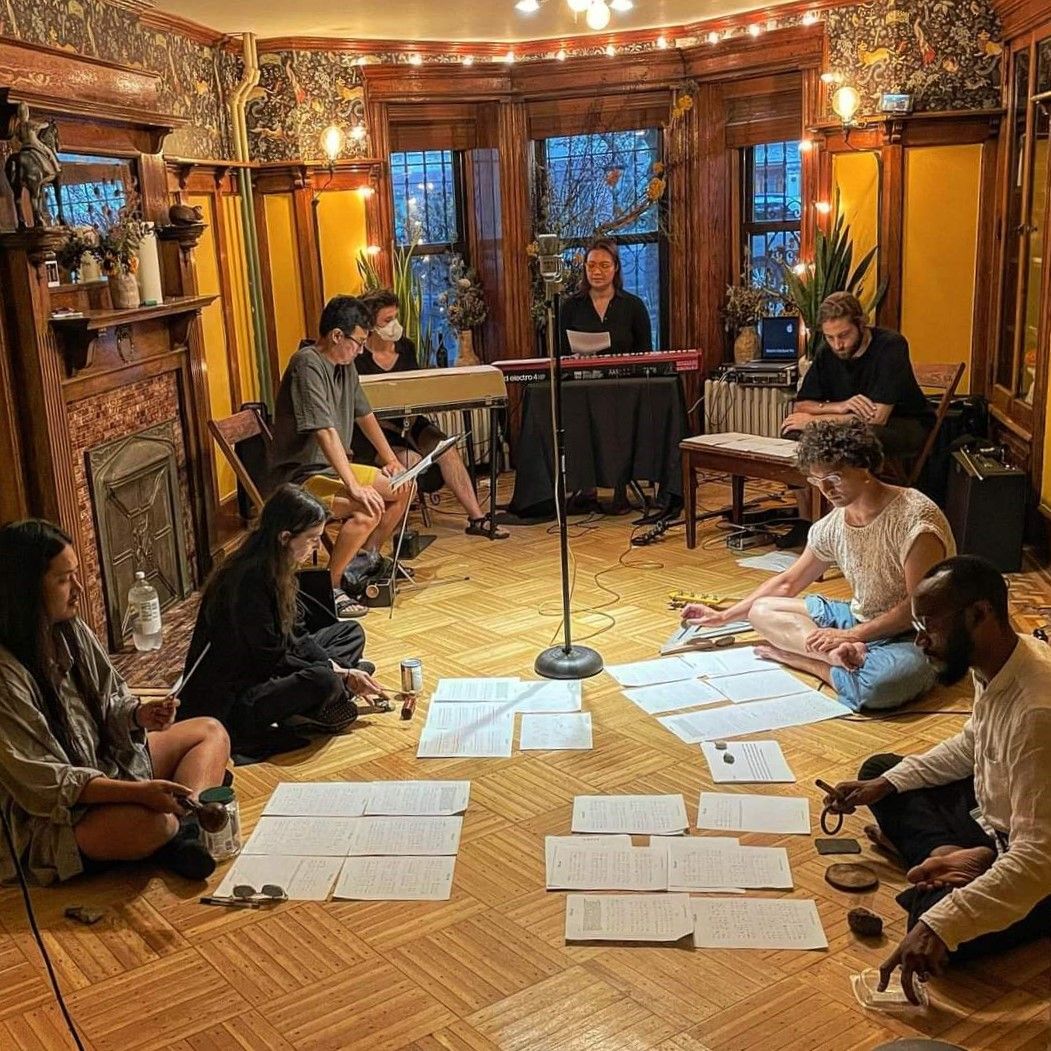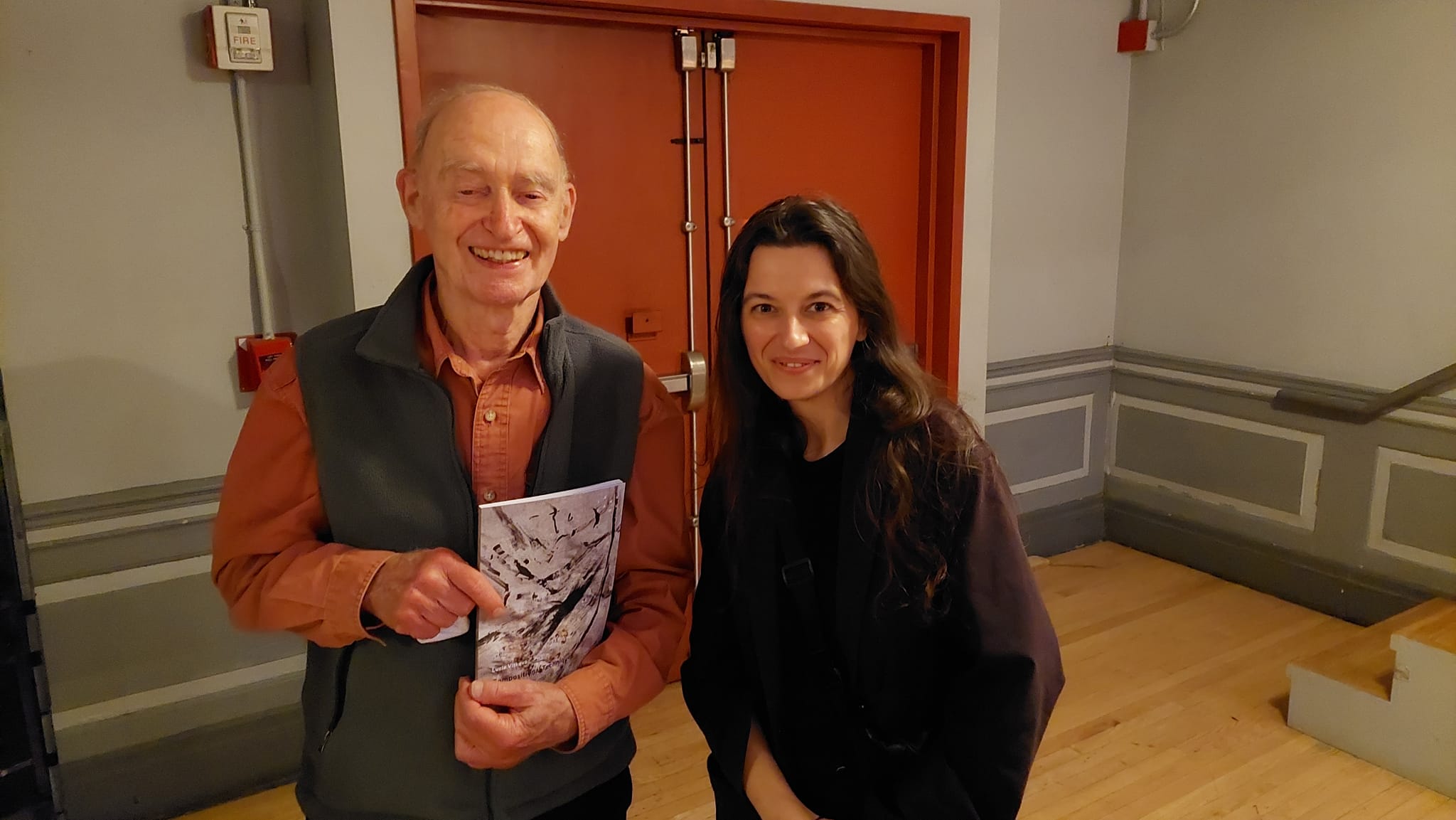In the Compositional Techniques of Christian Wolff and Social Aspects in Music, I share research on Christian Wolff’s music in the social-political context. The book deals with his compositional techniques and inner structures of his pieces which are connected with the relationships between the players, particularly how these relationships are constructed in a democratic manner and their influence on the audience and players in a broader social sense.
I was very pleased to read a wonderful commentary directly from Christian in his email to me this year: “I finished your book/dissertation. I think it's very good, especially the combination of analysis with your direct experience of performing. You are the first to do that on such a scale. The pianist Philip Thomas has done something like it, writing about his playing of some of my piano music. But that's for solo playing. You treat the ensemble situation which is closer to social issues.”
I'm happy to share an excerpt from my book below, the first run of the book sold out completely but it has received its second printing. If you'd like to purchase a copy (copies are $25 + USA shipping), you can contact me directly via email: musicvitkovalucie@gmail.com, Instagram: @lucie__vitkova and Facebook: under the name Lucie Vítková. This excerpt is shared with the expressed permissions of JAMU Publishing.

3. Compositional Techniques of Christian Wolff: Introduction
3.1 Five Main Aspects
There are five common aspects which underlie Wolff‘s work. (ASPLUND, HICKS 2012) In his compositions, there is always some degree of change, teaching, indeterminacy/unpredictability, freedom, and noise. In this chapter, I will introduce these aspects, since they will often be present in my analysis and maybe key to understanding his pieces.
a) Change
Wolff tries to avoid the repetition of “compositional tricks” and to include new ideas in each piece. He thinks of this principle of change in terms of Ezra Pound’s instruction to “Make it new”, or the concept of “Making strange”:
“make it new”, a notion, I believe, which derived from the generation of Russian and Czech literary critics who grew up around the 1917 revolution, and who spoke of “making strange”, that is, de-contextualizing the familiar, the conventional and status quo, thus making it an object of critical reflection […] My notion of change extends also internally, not just to the relation of my work to others’ but also to itself over time. (WOLFF 1998)
In most of his pieces, Wolff avoids the use of repetition, he is always developing his pieces and pushing them forward. When he exhausts a certain technique, he continues with a new one. When reusing techniques, there is always an element which is new or different; it may change with instrumentation, or even depending on the people he is composing the piece for.
For example, In Between Pieces uses a symbol to instruct players to play a sound which has not been heard in the piece before. In this way, the players can bring something unexpected, something that changes the piece and the composer’s choice of sounds for it, coming from the player’s own experience and history.
b) Teaching
Christian Wolff was a university professor for most of his life. The teaching aspect of his work derives from his teaching career and lies at the very core of his compositions. However, his approach to teaching is not authoritative. Instead, he tries to motivate students to find their own way, by allowing them to work on tasks individually, instead of kowtowing to the teacher’s point of view. Similarly, those who perform his work have to co-create the pieces built on their own experience, and possibly discover their own way of playing them in the process.
Most of the pieces have a multi-layered teaching aspect that ranges from the content and context of the piece, to the notation – such as the notation for each finger of a hand in Balancing (solo accordion) – or unique compositional techniques which make people relate to each other on a new level, such as in Changing the System, where Wolff teaches the players to share space and interact in an egalitarian manner. He also teaches openness to interpretation and instrumentation, such as in the pieces with open instrumentation, or using everyday life objects to play percussive sounds (Stones, Sticks). In the political context, he draws attention to revolutionary figures and events and uses text to educate his audiences about them.
In other pieces, he brings people together to play, such as in the Prose Collection pieces, which can be read and played by musicians as well as amateurs and non-musicians. According to my observations, the teaching aspect seems to be the most common throughout his work, since in every composition I find some didactical element. Wolff himself says:
Because my musical procedures require of the performers new kinds of musical responses, interdependence and decision-making both independent and determined by the decisions of others (both the composer and other performers), the process of putting a piece together and performing it have in themselves a pedagogical character. (…) Much of this music also has a learning dimension insofar as its notations are mostly new ones or different uses of the old ones, which even experienced professional musicians have to learn from scratch. (WOLFF 1998)
c) Indeterminacy / Unpredictability
Wolff, similarly to Cage, incorporates indeterminacy and unpredictability in his compositions (indeterminate pitch, rhythm, and instrumentation). Unpredictability is represented in his piece by unexpected moments: “The trick is suddenly to appear in a place without apparent means of transport.” (CHASE, THOMAS 2010)
Christian Wolff’s pieces are based on complex underlying systems which have an unpredictable logic, so that the player and listener find themselves in a completely new place very suddenly. Wolff explains, “These turns to indeterminacy look like ways out of difficult situations, like solutions to problems or impasses, solutions that so to speak, leapfrogged the problems in an unexpected direction.” (WOLFF 1998)
Members of the New York School utilized a wide range of different indeterminate strategies, some of them connected with gesture and improvisation, such as in the work of Earl Brown. According to Wolff, David Tudor’s indeterminacy and imagination of music was reminiscent of painting through action, such as the work of Jackson Pollock. Wolff identified more with John Cage’s strategies, though he did not want to echo Cage too closely. (WOLFF 2019) Wolff’s indeterminacy was developed during the performance, as he stated in one of our interviews: “I used no chance procedures, I hardly ever used chance procedures in my life in the actual writing, but I decided to have it, write, in such a way that when it was performed that’s when the indeterminacy would come to it.” (WOLFF 2019)
d) Freedom
In his pieces, Wolff expresses the aspect of freedom in various ways: the players have to think about the material, make their own decisions about timing, and share power of leadership with each other as well as with the composer and conductor. Moreover, Wolff challenges the audience to create their own interpretation, and gives them freedom to assign their own meanings to his music.
The aspect of freedom might also be connected with improvisation, since both Wolff’s pieces and improvisation function as a departure from established norms. Free improvisation can signify different situations: it can represent liberating oneself from the mainstream, or from more traditional musical frames, it can also give the players free roam to think and create their own music. Wolff expressed his conception of freedom in music as follows:
… freedom from the exercise of excessive constraint, from the imposition of rhetorical gestures, from inflexible rationalism, from effort to push sounds and people around, recognizing that the latter are critical centers of musical production; also free from having to sustain, beyond desire or useful purpose, a fixed identity. For the performers: free to exercise their identities; to produce rather than reproduce music; to make in confidence decisions, engaged within a conversation with the composer’s score. For listeners: free (and encouraged) simply to listen and work out for themselves what they might be listening for. (WOLFF 1998)
Again, the idea of freedom might have come from Wolff’s exposure to Dixieland when growing up in New York. He was not influenced by the sound, but the inherent mission of jazz music must have left a great impact on him.
e) Noise
Wolff calls the fifth aspect noise. In his pieces, noise can be represented by structures with indeterminate pitch or with the use of percussive sounds or instruments. He often encourages players to bring objects to his pieces that produce a variety of sounds, and only determines the scale of resonance and suggests the material, such as in Changing the System in part IIa. The noise parts with indeterminate pitch have the same amount of space in his compositions as the through-composed pitch structures, keeping an equal balance of different kinds of expressions.
In contemporary pieces, the noise sounds sometimes function as mere decorations to pitched material. The noise elements are often represented by instrumental and vocal extended techniques (there are certain pieces which portray only extended techniques of playing). Wolff does not seem to be interested in instrumental and vocal extended techniques. He always introduces new ways of relating to both the objects and the instruments. His instrumental range often keeps to a more general sound and techniques; his main concern lies in constructing the relationships – such as in Duo for Violins – where he uses the intervals and lengths of the tones to produce different sounds. When he wants to introduce non-pitched areas, he uses percussion instruments (such as in Exercises, where the percussion instruments are notated in number notation) or objects of everyday use. With objects, he deconstructs the characteristics of each material and tries to find relationships within his sonic approach. While not imposing any musical aesthetics onto the materials on a large scale, he is aiming for the middle ground, respecting the context of everyday objects and mixing them with the musical field. Wolff uses noise when the music is in danger of being dominated by pitched material, or if the compositional process with pitches has brought him to a dead end. He considers noise “a way out, but also, a way out I think of as extending the music, adding to its grain.” (1998) His relationship to noise is not just a way of escape: he values it on the same level as the pitch field and allows it the same amount of space as the pitched areas. We can perceive Wolff’s noise not only as non-pitched material; it is also bound to freer interactions between players or indeterminate sections of his music.
These five main aspects merge in his work to varying extents. Some are used to create sound textures; others develop relationships between the players, such as the hocket techniques. Because of the use of these five common elements, there is no significant division between Wolff’s earlier and later work. He uses similar principles throughout, adjusting them according to the requirements of each situation while being commissioned to write a new piece for a new instrumentation.

Resources:
ASPLUND, Christian; HICKS, Michael. Christian Wolff. Urbana, Chicago, Springfield: Board of Trustees of University of Illinois, 2012. ISBN 978-0-252-03706-1.
CHASE, Stephan; THOMAS, Philip (ed.). Changing the System: The Music of Christian Wolff. Farnham: Ashgate Publishing Limited, 2010. ISBN 978-0-7546-6680-6.
WOLFF, Christian. Interview. Conducted by Lucie Vítková. 16 Aug 2019.
WOLFF, Christian. The Cues: Writings and Conversations by Christian Wolff. Köln: MusikTexte, 1998. ISBN 3-9803151-3-4. P.326,
VÍTKOVÁ, Lucie. Compositional Techniques of Christian Wolff and Social Aspects in Music. Brno: JAMU, 2021. ISBN 978-80-7460-189-7. pp. 32-35.


